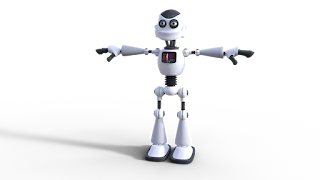As San Francisco's residents shelter in place, coyotes are emerging on the streets; A Harvard Working Paper gives best practices for business to use in preparation for novel risks; A training simulator aims to make autonomous safer before encountering real-world roads; An article suggests using wastewater sampling to identify drug usage trends; and a Steem post offers two web sites with learn-at-home resources for students
Saturday, March 28, 2020
Curating the Internet: Science and technology digest for March 28, 2020
Labels:
artificial intelligence,
Autonomous Vehicles,
business,
Drug Abuse,
Education,
Law Enforcement,
Nature,
Novel Risk,
physics,
Programming,
Public Health,
Reinforcement Learning,
Risk,
San Francisco,
Wildlife
Friday, March 27, 2020
Curating the Internet: Science and technology digest for March 27, 2020
A TED talk describing the "code for Venezuela" project and its emergent solutions; A new app helps researchers track coronavirus and learn about risks; Google eliminating the "User Agent" string from its Chrome browser; DIY face shield finds its way into hospitals and onto Ford's production floor; and a Steem embedded video discussing the nature of the US election system
Thursday, March 26, 2020
Curating the Internet: Science and technology digest for March 26, 2020
MIT researchers submit a $100 open source ventilator for FDA approval; Chinese company offers facial recognition for people wearing masks; A new AI system approaches 100% accuracy on cancer diagnoses; A Cold-War era submarine wreck is located off the coast of Oahu, Hawaii; and a Steem post argues that surveillance may be useful for COVID-19 in the short term, but it poses long term risks
Wednesday, March 25, 2020
Curating the Internet: Science and technology digest for March 25, 2020
Storj Labs launches decentralized cloud storage service, Tardigrade; Brave browser teams up with Binance to offer in-browser cryptocurrency trading; Recent evidence suggests that Schizophrenia may be an autoimmune condition; Lawyers advise to switch of smart-devices when working from home and discussing confidential information; and a Steem essay informs us that home tests for coronavirus can now be purchased online (when they're not sold out)
Labels:
blockchain,
Brave Browser,
business,
cloud,
Coronavirus,
COVID-19,
Cryptocurrency,
Health,
Immune System,
Mental Health,
privacy,
Schizophrenia,
Software,
Storage,
Storj,
Technology
Tuesday, March 24, 2020
Curating the Internet: Science and technology digest for March 24, 2020
A TED talk gives the research history of the so-called "sex chromosomes"; Scientific theories behind the deja vu experience; A new attack tricks artificial intelligence systems into mischaracterizing images; Cancer research retracted after 14 years and more than 900 citations; and a Steem essay describes a doctor's efforts to prepare for coronavirus in Bangladesh
Labels:
artificial intelligence,
biology,
Cancer,
Coronavirus,
COVID-19,
cybersecurity,
Deja Vu,
information security,
infosec,
Medicine,
neuroscience,
Psychology,
TED,
Ted Talks,
tedtalks
Monday, March 23, 2020
Curating the Internet: Science and technology digest for March 23, 2020
Jaron Lanier and Glen Weyl argue for data dignity, suggesting that human contributions to AI systems need to be accounted for; Microsoft Windows' Explorer and Start Menu may be getting a new look; Firefox continues its slow elimination of the unencrypted ftp protocol; Microsoft responds to allegations that the Edge browser is bad at privacy; and a Steem essay discussing Superworms that can survive by eating plastic
Labels:
ai,
artificial intelligence,
biology,
cybersecurity,
Data Dignity,
Encryption,
Environment,
Firefox,
FTP,
Glen Weyl,
information security,
infosec,
Jaron Lanier,
Microsoft,
privacy,
Windows,
Windows 10
Sunday, March 22, 2020
Curating the Internet: Science and technology digest for March 22, 2020
IEEE Spectrum's weekly selection of awesome robot videos; A new technique is able to decipher ancient languages by comparing to modern languages along with existing translations; An archaeologist is saving a digital archive of historic sites in the Yukon and using it to create an online virtual exhibit; George R. R. Martin says he's spending coronavirus down-time writing about Westeros; and a Steem essay describes an algorithm to find a longest substring with no repeating characters
Labels:
Algorithms,
Artificial Intelliegence,
Bamboo,
Coronavirus,
COVID-19,
drones,
Game of Thrones,
George R. R. Martin,
Go,
Language,
Novel Coronavirus,
Programming,
robotics,
Westeros
Saturday, March 21, 2020
Curating the Internet: Science and technology digest for March 21, 2020
Stanford soft robot operates without hydraulics or pneumatics; $1 million Turing award goes to Pixar pioneers in computer graphics; Developer acceptance increasing for Windows Subsystem for Linux; New map of the Milky Way galaxy reveals at least four spiral arms; and a Steem photo-essay tells us about the mineral, amethyst
Friday, March 20, 2020
Curating the Internet: Science and technology digest for March 20, 2020
Whitehouse promotes machine learning for coronavirus solutions; Security advice for the emerging work-from-home employers; Chloroquine and hydrochloroquine may offer low cost and effective treatment against COVID-19 and other viruses; How the coronavirus pandemic is permanently reshaping the business landscape; and a Steem essay acknowledges limited data, but argues that - at the moment - coronavirus infections are not growing at an exponential rate
Labels:
business,
Chloroquine,
Coronavirus,
COVID-19,
cybersecurity,
Hydorxychloroquine,
information security,
infosec,
Machine Learning,
Pandemic,
Policy,
Strategy,
Supply Chain,
Work from home
Thursday, March 19, 2020
Curating the Internet: Science and technology digest for March 19, 2020
Ultrasonic attack can break into cell phones through a solid surface; Monkeys develop immunity to SARS-CoV-2 after first infection; Hiker finds two bombs from 1935 in a Hawaiian volcano; Commentary arguing that once a medical treatment comes into common practice, it persists long after it's found to be useless, or even harmful; and a Steem essay describing a dive to the USS Oriskany aka The Great Carrier Reef
Tuesday, March 17, 2020
Curating the Internet: Science and technology digest for March 18, 2020
A TED talk discusses human comfort levels with artificial intelligence systems; Commentary suggests that working from home was normal and expected for much of human history; An open access database contains metadata from 29,000 coronavirus studies and full text from 13,000; The TSA is now permitting larger bottles of hand sanitizer on flights, and Bruce Schneier argues that this is an implicit concession that the ban was never needed; and a Steem essay describing the Rhoeo Discolor, a plant that grows in South and Central America
Curating the Internet: Science and technology digest for March 17, 2020
Brave Browser files GPDR complaint against Google, claims Google violates "purpose limitation principle"; Study suggests that mothers have implicit bias about emotional expression between genders, fathers don't; Researchers suggest there is no underlying cause to mood disorders; Microsoft Teams buckled when telecommuting Europe showed up for work; and a Steem essay discussing essential aspects of remote learning
Labels:
Brave Browser,
Collaboration,
cybersecurity,
Education,
Gender Bias,
Google,
GPDR,
Implicit Bias,
information security,
infosec,
Microsoft,
Online Learning,
privacy,
Psychology,
Remote Learning,
Telecommuting
Monday, March 16, 2020
Curating the Internet: Science and technology digest for March 16, 2020
5G wireless is driving up the cost of smartphones; Doctors in Israel removed an entire lung from a patient, eliminated all cancerous cells, then reattached the lung; Whisper app for secret sharing revealed individuals' locations, ages, and other details; Advice for people who are working from home because of the coronavirus; and a Steem post describing a youtube video where chickens were hatched from store-bought eggs
Labels:
5G,
Agriculture,
biology,
Blackmail,
Cancer,
cybersecurity,
information security,
infosec,
Medicine,
privacy,
Smart Phones,
Surgery,
telecommunications,
Telecommuting,
Whisper,
Wireless
Sunday, March 15, 2020
Curating the Internet: Science and technology digest for March 15, 2020
Previously unseen footage of a Thylacine or Tasmanian Tiger; IEEE Spectrum's weekly selection of awesome robot videos; Microsoft announces the end of the line for the Visual Basic programming language; Researchers adapt flu prediction methods to the novel coronavirus; and a Steem essay describing the race to blanket the Earth in satellite-based Internet coverage
Labels:
CDC,
Coronavirus,
Extinction,
Forecasting,
History,
IEEE Spectrum,
internet,
Microsoft,
OneWeb,
Programming,
robotics,
Satellites,
space,
StarLink,
Tasmanian Tiger,
Thylacine,
Visual Basic
Saturday, March 14, 2020
Curating the Internet: Science and technology digest for March 14, 2020
An electric motorcycle that's constructed from wood is on pre-sale for 2021 deliver; Coinbase announces BTC transaction batching in order to reduce fees and overhead; A cryptography pioneer discusses election security; Firefox add-on puts Facebook in its own container to limit snooping; and a Steem essay discusses the science behind snoring
Friday, March 13, 2020
Curating the Internet: Science and technology digest for March 13, 2020
Autonomous robots deployed to sterilize hospitals in China; Los Angeles Department of Water and Power accused of cybersecurity coverup; People with celiac disease may soon be able to eat gluten; IBM upgrading Watson to include advances from Project Debater; and a Steem photo-essay describes the engineering of a hundred year old Brownie camera
Labels:
artificial intelligence,
Automation,
Celiac Disease,
COVID-19,
cybersecurity,
Engineering,
ibm,
information security,
infosec,
Medical Research,
Medicine,
Photography,
Project Debater,
robotics,
Watson
Thursday, March 12, 2020
Curating the Internet: Science and technology digest for March 12, 2020
Hunter gatherers wear fitbits and researchers say they're just as sedentary as modern societies.; A caution against harming the weakest students by moving classes online; Physicist suggests that dark matter may be comprised of a six-quark particle (hexaquark); Audit finds hospitals at risk of hacking do to obsolete systems; and a Steem essay describing the profession of an underwater archaeologist
Labels:
Anthropology,
archaeology,
COVID-19,
cybersecurity,
Dark Matter,
Education,
Finance,
Hexaquarks,
Hospitals,
Hunter-gatherers,
information security,
Remote Learning,
Underwater Archaeology
Wednesday, March 11, 2020
Curating the Internet: Science and technology digest for March 11, 2020
A robot inspired by baby deer that can teach itself to walk; Brave Browser partners with TAP Network to connect BAT tokens directly to retailers; A fireside chat including the controversial and eccentric Craig Wright and economist George Gilder; Master's thesis finds that rocks from Earth and Moon are less similar than previously believed; and a Steem essay discussing the theoretical possibility of "bubbles of nothing" that could destroy the universe
Labels:
Astrophysics,
Basic Attention Token,
Brave Browser,
BSV,
Craig Wright,
Cryptocurrency,
George Gilder,
Metanet,
moon,
Nature Inspired Computing,
physics,
robotics,
Rocks,
String Theory,
Theia,
Walking
Tuesday, March 10, 2020
Curating the Internet: Science and technology digest for March 10, 2020
Automatic pricing algorithms could reduce competition and raise consumer prices; Robot swarm achieves goals without central orchestration; Lettuce grows on the International Space Station (ISS); Google releases open source TensorFlow Quantum to streamline quantum machine learning; and a @steemhunt post that draws attention to a children's exotrainer for repairing muscular atrophy
Labels:
Agriculture,
ai,
artificial intelligence,
business,
Exoskeleton,
Exosuit,
Exotrainer,
Google,
ISS,
Machine Learning,
neural networks,
Pricing,
Quantum Computing,
robotics,
space,
Swarms,
TensorFlow Quantum
Monday, March 9, 2020
Curating the Internet: Science and technology digest for March 9, 2020
Study finds that low-carb diets may prevent and reverse age-related cognitive decline; IEEE Spectrum's weekly selection of awesome robot videos from March 6.; a Steem essay describing the current state of knowledge on the novel coronavirus (COVID-19); A podcast argues that bitcoin mining might be returning to the US, and that it might represent a new business model for power plants; and a TED talk describing research into how specific neural pathways in the brain impact behavior
Sunday, March 8, 2020
Curating the Internet: Science and technology digest for March 7, 2020
Harvard Working Paper suggests that occupational licensing reduces competition and fails to improve consumer satisfaction; More on the health-care robot that automates needle insertion for blood draws and fluid delivery; Glassware in Japan dates to Persian dynasty between years 226 and 551; Study in Finland finds that pet dogs are surprisingly anxious and stressed; and a Steem photo-essay with original nature-photography from Bangladesh
Labels:
Anxiety,
archaeology,
Automation,
business,
Dogs,
Health Care,
Japan,
Nature photography,
Observations,
Occupational Licensing,
Persia,
Policy,
robotics,
Sassanian dynasty,
Stress,
Wildlife
Friday, March 6, 2020
Curating the Internet: Science and technology digest for March 6, 2020
A TED talk by a security researcher gives a rundown on "stalkerware"; A Youtube video addresses Peto's Paradox - the surprising observation that larger animals are less likely to get cancer; Microsoft announces a free tier of its Cosmos DB NoSQL database; Twitter is testing fleets, transient tweets that expire after 24 hours; Brave Browser announces a state of the art privacy enhancement; and a Steem essay discusses the nature, causes, and treatments for post-traumatic stress disorder
Thursday, March 5, 2020
Curating the Internet: Science and technology digest for March 5, 2020
Partnership between Boston Dynamics and Otto Motors makes warehouse automation safer; A paper claiming a link between the Sun and global warming was retracted. The authors dispute the action.; Computers suggest that between 1700 and 1910, Beethoven was the most influential piano composer and Rachmaninoff was the most innovative; A new AI chip makes image recognition much faster; and a Steem author reviews the Brave Browser
Wednesday, March 4, 2020
Curating the Internet: Science and technology digest for March 4, 2020
Honeywell claims quantum breakthrough that's twice as powerful as IBM and Google offerings; A satirical browser extension responds to the coronavirus by adding medical masks to images that contain faces; British historians find a secret door in Parliament's House of Commons; Twitter gives blue check mark to fake politician invented by high school student; and a Steem essay discusses incision and drainage as a treatment for subcutaneous abscess
Tuesday, March 3, 2020
Curating the Internet: Science and technology digest for March 3, 2020
Dogs' noses can sense the ambient warmth of their prey from a meter and a half away; "Fake news" didn't have much impact on the 2016 election; An attempt at estimating numbers of unreported cases of the novel coronavirus (COVID-19); Xerox offers $24 per share to buy HP. HP says no thank you.; and a Steem "citizen science" photo-essay with bird photography and siting counts
Monday, March 2, 2020
Curating the Internet: Science and technology digest for March 2, 2020
American consumers get gun-shy after data breaches; The Brave browser adds feature to do Wayback Machine look-ups for missing web pages; Ex-Googler, Eric Schmidt, argues for massive investment in emerging technologies and intellectual capital; Another safety and feasibility trial finds that CRISPR gene editing is safe for cancer therapies; and a Steem post with photos of the ATLAS comet (Comet C/2019 Y4)
Labels:
artificial intelligence,
Astronomy,
Biotechnology,
Brave Browser,
business,
Cancer,
Comets,
CRISPR,
cybersecurity,
Funding,
information security,
New Features,
Policy,
privacy,
Quantum Information Science
Sunday, March 1, 2020
Curating the Internet: Science and technology digest for March 1, 2020
IEEE Spectrum's weekly selection of awesome robot videos; A report on browser privacy finds that Brave leads the pack, Microsoft Edge and Yandex trail; Theorists still don't totally understand how planes fly; A new study sees brain waves as a form of "what if" testing; and a Steem essay with embedded video describing a first-hand observation of baboons in the wild
Saturday, February 29, 2020
Curating the Internet: Science and technology digest for February 29, 2020
Artificial intelligence predicts heart attacks, strokes, and even deaths better than doctors with traditional techniques; Unisys CEO predicts a year of transition, and also a possible return of acquisition activities; Freeman Dyson was almost certainly my favorite science & technology writer. He died on Friday (Feb 28); Texas wind-power is driving a Bitcoin mining expansion in the state; and a Steem essay describing new research into leptoquarks at the Large Hadron Collider
Friday, February 28, 2020
Curating the Internet: Science and technology digest for February 28, 2020
Smithsonian Institute puts 2.8 images into the public domain; Coinbase Child pays for parent (CPFP) technique supports zero-fee BTC transactions in its custody product; The US Department of Defense has adopted principles for ethical adoption of artificial intelligence; A summary of a recent Association for Computing Machinery (ACM) conference on ethical artificial intelligence; and a Steem post that describes a biodegradable coffee cup that can be used to plant trees
Thursday, February 27, 2020
Curating the Internet: Science and technology digest for February 27, 2020
Harvard researchers find that free open source software (FOSS) comes with a cost; Small levels of daily alcohol consumption may increase longevity, but binge drinking may reduce it; A recently declassified report reveals that the NSA phone meta-data monitoring program is expensive and unproductive; An argument that researchers need to study deceptive practices that emerge naturally in artificial intelligence (AI) systems; and a Steem essay describing a recent search for dark matter in the Earth's core.
Wednesday, February 26, 2020
Curating the Internet: Science and technology digest for February 26, 2020
Researchers suggest that Moore's Law has ended and suggest a path forward; Vote-buying goes mainstream on the EOS blockchain; Tim Draper eschews stocks in favor of Bitcoin and predicts BTC $250,000 by 2022; The first known animal that doesn't breathe has been discovered; and a Steem essay talks about the use of robotics in the oil industry
Tuesday, February 25, 2020
Curating the Internet: Science and technology digest for February 25, 2020
Better information doesn't always lead to better decisions; A new robot passed its first trial at taking blood samples from human patients; Archaeologists discovered a sophisticated Soviet Spy radio when digging for a Roman villa; University of North Carolina survey finds surprisingly broad support for free speech, but also disparities between political conservatives and liberals; and a Steem essay reporting on the Sunday Night Soft Fork
Monday, February 24, 2020
Curating the Internet: Science and technology digest for February 24, 2020
Global greening confirms and mitigates climate change; Artificial intelligence discovers powerful antibiotic that even kills drug-resistant bacteria; An AI system rewrites text in a way that confuses other AI systems; A TEDed video on the nature and meaning of Viking runes; and a Steem essay announcing a new community for coronavirus discussions
Sunday, February 23, 2020
Curating the Internet: Science and technology digest for February 23, 2020
IEEE Spectrum's weekly selection of awesome robot videos; Bruce Schneier joins the effort to bring the Solid data-ownership protocol to the main-stream; Snap chat set to offer in-app mental health tools; A Youtube video about the possibility that photosynthesis uses a quantum-mechanical search technique; and a Steem essay on the topic of myotoxins or mold toxins
Labels:
Bruce Schneier,
DARPA,
Data Ownership,
drones,
Mental Health,
Mold,
Mold Toxins,
Myotoxins,
Quantum Biology,
Quantum Mechanics,
Quantum Search,
robotics,
Snapchat,
Social Media,
Solid,
Spot,
Ted Talks,
Toxicology
Friday, February 21, 2020
Curating the Internet: Science and technology digest for February 22, 2020
Garry Kasparov looks at the growth of artificial intelligence after his 1997 chess loss to IBM's Deep Blue; A TED talk argues that people should own their digital data; Sweden is testing a government-backed digital currency, the e-korona; Solving the so-called Molyneux's Problem, bumblebees can transfer recognition of a shape from touch to sight; and a Steem essay discusses alkanes, petroleum octane, engine knocking and pollution
Curating the Internet: Science and technology digest for February 21, 2020
First trial successful for high-precision robot-assisted surgery; A kit has been released for an open source rotary cell phone; Sia launches Skynet, a blockchain based peer to peer web hosting service; A PBS Space Time video discussing the relationship between quantum mechanics and consciousness; and a Steem essay discusses the use of virtual reality in medicine.
Labels:
blockchain,
cloud,
Consciousness,
Cryptocurrency,
Medicine,
Philosophy,
Quantum Physics,
robotics,
rotary cell phone,
rotary phone,
sia,
skynet,
supermicrosurgery,
Surgery,
telecommunications,
virtual reality
Thursday, February 20, 2020
Curating the Internet: Science and technology digest for February 20, 2020
A paper that claimed link between heart-attacks and vaping has been retracted; IOTA found the bug that led to their recent hack, and patched the wallet, but their network remains offline; Tech Mahindra and the Indian state of Telengana have launched blockchain accelerator with plains for creating the blockchain capital of the world, centered in Hyderabad; An argument for a grand program to put the US back ahead of China in STEM capabilities; and a Steem essay discussing research that found a link between seismic activity and movement of the Earth's poles
Labels:
blockchain,
Cryptocurrency,
cybersecurity,
Geology,
Heart Attacks,
Hyderabad,
India,
information security,
IOTA,
New Manhattan Project,
retraction watch,
Tech Mahindra,
Vaping,
Volcanology
Wednesday, February 19, 2020
Curating the Internet: Science and technology digest for February 19, 2020
An article suggests reasons why disease outbreaks frequently start in China; A mundane retraction spurs questions about the review process; Suggestions to make the study of consciousness tractable, scientifically; Disclosure of a WordPress bug that impacts 200,000 sites; and a Steem post with an embedded video discussing the science behind hypnosis
Tuesday, February 18, 2020
Curating the Internet: Science and technology digest for February 18, 2020
Researchers map path for reliable bottom-to-top information flow in an organization; Cyborg grasshoppers can detect explosives; Boeing 737 Max begins test flights in preparation for return to service; Researchers publish open source 3D model for brain cancer growth; and a Steem essay discusses the related conditions of gigantism and acromegaly
Monday, February 17, 2020
Curating the Internet: Science and technology digest for February 17, 2020
An argument that cancer screening is more about business than health, and that in 90 years, the only substantial progress at reducing cancer has been the decline of smoking; Quantum entanglement has been accomplished through 30 miles of fiber; Internet Assigned Numbers Authority (IANA) forced to postpone key-signing ceremony after being locked out of a safe; An argument against productivity metrics that ignore quality; and a Steem report on a controversial Tweet by Richard Dawkins on the topic of eugenics
Labels:
biology,
business,
Cancer,
Cancer Treatment,
DNSSEC,
Ethics,
Eugenics,
IANA,
Management,
Medical Ethics,
Medicine,
Metrics,
Quantum Entanglement,
Quantum Internet,
Quantum Physics,
Technology Management
Sunday, February 16, 2020
Curating the Internet: Science and technology digest for February 16, 2020
IEEE Spectrum's weekly selection of awesome robot videos; An argument for the existence of free will; A study on reporting on a relationship between university student population sex ratios on one hand and nearby feral cat populations on the other was taken down and classified as "Temporarily Removed after an outraged "Tweet Storm"; A TED talk suggests that online marketplaces can thrive by investing in local entrepreneurs who are disrupted by their incursions; and a Steem post with descriptions and photos of green-blooded skink lizards
Saturday, February 15, 2020
Curating the Internet: Science and technology digest for February 15, 2020
AI can predict which patients will benefit from anti-depression treatments; Controversial Satoshi claimaint, Craig S. Wright, claims licensing violation for the Bitcoin ledger; US DoJ arrests coin-mixing technologist for money laundering; Big news in the Steem ecosystem, TRON acquired Steemit; and a Steem photo-essay with photos of rare minerals for an upcoming gem show in Japan
Friday, February 14, 2020
Curating the Internet: Science and technology digest for February 14, 2020
The IOTA foundation is responding to a hack; Boston Dynamics' Spot robot reports for duty on an oil rig; An "information ecology" framework for dealing with "fake news" considers misinformation and disinformation to be forms of information pollution; The University of California cancels its subscription to Elsevier; Brush fires uncover a historical stone-carved boomerang in Australia; and a Steem essay describing an ad-hoc operation to rescue an injured wild eagle
Thursday, February 13, 2020
Curating the Internet: Science and technology digest for February 13, 2020
Starting in the 1970s, the CIA and West German Intelligence used a front company to sell encryption services to unsuspecting geopolitical adversaries; Patches released for Cisco device flaws that expose corporate networks to elevated intrusion risk; Protecting supply chains against disruptions; A new implant that plugs directly into the brain is being developed for blind people; and a Steem post provides a collection of links about the Wuhan coronavirus / COVID-19
Labels:
Best Practices,
Blindness,
BND,
Brain Implant,
business,
CIA,
Cisco,
COVID-19,
CryptoAG,
cybersecurity,
Espionage,
information security,
infosec,
Supply Chain,
Supply Chain Disruption,
Wuhan Coronavirus
Wednesday, February 12, 2020
Curating the Internet: Science and technology digest for February 12, 2020
Philadelphia fintech panel says blockchain hype died down but growth continues; Harvard faculty discusses the impact of emerging technology on business; An article highlights the long under-appreciated glial brain cells; Why Valentine's Day can be hard on some relationships; and a Steeem post describing an animal trial of 3D printer of synthetic skin for burn victims
Labels:
3D Printing,
blockchain,
business,
Drexel University,
Emerging Technology,
Fintech,
Glial Cells,
Harvard,
neuroscience,
Philadelphia,
Relationships,
Synthetic Skin,
Valentines Day,
Vanguard
Tuesday, February 11, 2020
The Tsu brand may be rising from the ashes in early 2020
Launched in 2014, Tsu was one of the first social media sites that shared revenue with content producers. It went out of business in 2016, but now comes news that private real estate firm, Terracap Group and an intellectual property firm, Hilco Streambank bought the Tsu brand and they're working to bring it back to life.
This post first appeared on the Steem blockchain: Steemit.Com, Steempeak.Com*, StemGeeks.Net
Curating the Internet: Science and technology digest for February 11, 2020
Background radiation linked to longer life and lower cancer mortality; AI surveillance ramping up to keep tabs on the coronavirus; Surprising diversity revealed by ancient skeletons in Mexico; Satellite photos of Wuhan before and after the coronavirus quarantine; and a Steem essay discussing the security risks of "smart buildings"
Monday, February 10, 2020
Curating the Internet: Science and technology digest for February 10, 2020
Trials to reduce aging-related diseases move from mice to dogs; A TED talk describing the use of African bees to keep people and elephants from coming into conflict; The first US trial using CRISPR gene editing to treat cancer finds that the technique is safe; An argument that a quick retraction of an Open Access preprint shows science working as it should; and a Steem essay reports that music with a fast, strong, steady beat is best at enhancing exercise>br>
Labels:
Africa,
Aging,
Bees,
Cancer,
Coronavirus,
CRISPR,
Dogs,
Elephants,
Exercise,
Genes,
Music,
Philosophy,
retraction watch
Sunday, February 9, 2020
Curating the Internet: Science and technology digest for February 9, 2020
IEEE Spectrum's weekly selection of awesome robot videos; An argument that science is not complete until a good idea has achieved practical adoption; A Stem cell procedure may reduce or eliminate the need for heart transplants; The economics of bitcoin in light of the upcoming halving that's expected in May; and a Steem essay describing an AI effort to find Wuhan coronavirus treatments
Saturday, February 8, 2020
Curating the Internet: Science and technology digest for February 8, 2020
Maxthon browswer announces features for integration with Bitcoin Satoshi Vision (BSV); Block.one launches $200,000 prize for EOSIO smart contracts that enable processing in a virtual Ethereum-like environment; Facebook AI training method speeds reinforcement learning; New research into mammalian brains' forgetting mechanism; and a Steeem essay discusses the benefits and risks of technology advances
Subscribe to:
Posts (Atom)
















































